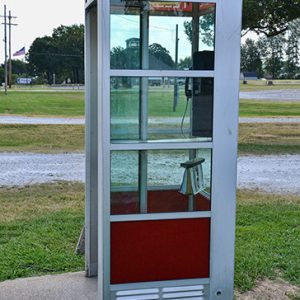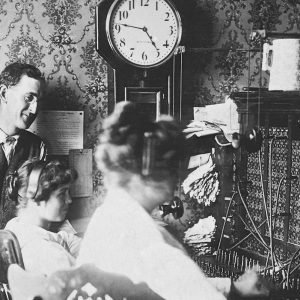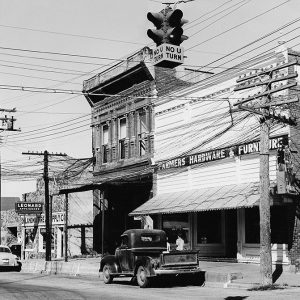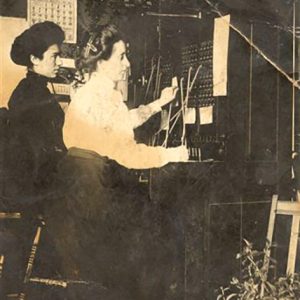calsfoundation@cals.org
Prairie Grove Telephone Company
aka: PGTelco
Owned and operated by four generations of the McCormick and Parks families since the late nineteenth century, the Prairie Grove Telephone Company (PGTelco) is one of the oldest family-owned telephone companies in Arkansas. The company established exchanges in five western Washington County communities: Farmington, Lincoln, Morrow, Prairie Grove, and Strickler.
Physician E. G. McCormick and his brother, Will McCormick, were co-owners of the McCormick Bros. drugstore that opened on Prairie Grove’s main street in 1884. Dr. McCormick’s clinic was located across the street from the drugstore, and in 1888 the brothers installed a telephone line between the two businesses. When some local residents expressed an interest in using the new technology, the brothers began to offer phone service to others as well.
In 1891, a group of Prairie Grove and Fayetteville (Washington County) residents started a campaign to raise $500 for a twelve-mile telephone line between the two towns. After successfully meeting the goal, one of the longest telephone lines in the state was constructed in the summer of 1892. It initially connected only three telephones, but that number soon grew.
Dr. McCormick’s son-in-law, James C. (Jim) Parks, began working for the company in 1901 as a switchboard operator directing calls for around thirty subscribers in Prairie Grove’s central office. By 1906, the McCormick’s small utility company had installed 160 phones connected to 130 miles of telephone lines throughout Prairie Grove and rural western Washington County. Due to their success and the increasing demand for phone service, E. G. and Will McCormick, along with McCormick Bros. drugstore employee Mel M. Collier, incorporated the Prairie Grove Telephone Company in October 1906.
Parks bought an interest in the utility in 1909 and was soon named general manager—and later president. The company continued to experience growth until the 1930s, when the effects of the Great Depression forced many subscribers to have their phone service shut off. However, Parks never disconnected any customers who were unable to pay for phone service and instead accepted payments of garden vegetables, eggs, and, in at least one instance, a cow.
Applications for telephone service increased after World War II ended in 1945. Parks’s sons—Donald, Barry, and Joe—returned to Prairie Grove after serving in the U.S. Army Air Forces and worked at the company setting poles and stringing wire to help meet the growing demand for service.
A catastrophic three-day ice storm hit the area in early 1949 and brought down almost all telephone lines in the company’s five exchanges. Out of an estimated 2,000 phones, only around eighty-five remained in service immediately after the storm. Facing a huge task of clean-up and repair, extra workers were hired to assist the three outside plant employees, and customers also volunteered their help. Six weeks after the storm, the final phone line was back in service.
By 1954, the company had moved into a new, more modern central office about a block away on Mock Street and installed new dial system equipment. In July 1954, Lincoln and Prairie Grove subscribers were moved to this new technology, the last of its five exchanges to be upgraded.
At the time of his death in 1958 from a stroke, Jim Parks had been with the company for fifty-seven years. Barry Parks became president and outside plant manager, and Donald Parks was named secretary-treasurer and general manager. Jim Parks’s widow, Myrtle McCormick Parks, was appointed vice president and served in that position until her death in 1978. The Parks brothers launched an ambitious $2 million project in 1970 to convert all of the company’s party lines to private. Seven years later, the company became the first multi-exchange telephone company in Arkansas to provide private lines to all of its customers. In 1979, the company updated its equipment to digital to offer customers the latest in touch-tone services.
In an effort to protect its lines from ice storm damage, the company embarked on a construction project in the late 1970s to bury the majority of its 750-mile rural cable. By September 1981, almost ninety percent of its rural lines were in the ground. During the latter part of this work in 1980, Donald Parks’s son, David Parks, started working at the company as an installer/repairman, and in 1987 he was named president, while Barry Parks became vice president, the first person to hold that position since 1978.
As the huge Bell System was being broken into separate and more competitive businesses during the early 1980s, the smaller independent phone companies throughout the United States addressed this new challenge by practicing good fiscal management and providing customers the latest in telecommunications technology. In 1984, the Prairie Grove Telephone Company launched its own pager business, and in the early 1990s it added satellite television and internet broadband access. As pagers became obsolete and the company’s focus turned to broadband, by 2015 only landline and internet services were available, and a construction project was started to install fiber optic cable to homes and businesses in some parts of their multi-exchange area.
Barry Parks’s daughters, Karen Parks-Gerwig and Susan Parks-Spencer, were appointed to the company’s board of directors in the 1990s. Barry Parks died in 2004 from the effects of Parkinson’s disease, and Rick Reed (who is not related to the family) was named vice president. In 2006, Donald Parks died. Reed became general manager.
In the early 2000s, the company changed its name to PGTelco to emphasize its evolution from a landline utility into a broadband provider. Its central office remained in Prairie Grove.
On June 7, 2014, in Prairie Grove, the last telephone booth operated by the company (installed around 1960) was damaged when it was struck by an SUV. The Prairie Grove Airlight Outdoor Telephone Booth (a new modern design at the time of its installation, meant specifically for outdoor use) was nearly removed permanently, but, due to the public’s response, the company repaired and restored the booth. It was placed on the National Register of Historic Places on November 9, 2015, the first such telephone booth to achieve that status.
For additional information:
Barry, Dan. “A Town Won’t Let Go of a Coin-Drop Line to the Past.” New York Times, July 5, 2014. Online at https://www.nytimes.com/2014/07/05/us/05land.html (accessed December 6, 2018).
Carfagno, Jacalyn. “Small Phone Companies Survive Gloom and Doom.” Arkansas Gazette, February 20, 1989, pp. 1C, 5C.
Hughes, Charlie. “Telephone Company Family Operation.” Northwest Arkansas Times, September 9, 1979, p. 5A.
Parks, Susan. “Telephone Company.” In Prairie Grove, Arkansas Centennial History: 1888–1988. Siloam Springs, AR: Siloam Springs Printing, 1988, pp. 102–104.
Trimble, Mike. “Company Keeps Watch Over Its Telephonists.” Arkansas Gazette, September 6, 1981, pp. 1F, 7F.
Susan Parks-Spencer
Prairie Grove, Arkansas
 Business, Commerce, and Industry
Business, Commerce, and Industry Prairie Grove Phone Booth
Prairie Grove Phone Booth  Prairie Grove Telephone Company
Prairie Grove Telephone Company  Prairie Grove Telephone Company Office
Prairie Grove Telephone Company Office  Telephone Operators
Telephone Operators 




Comments
No comments on this entry yet.